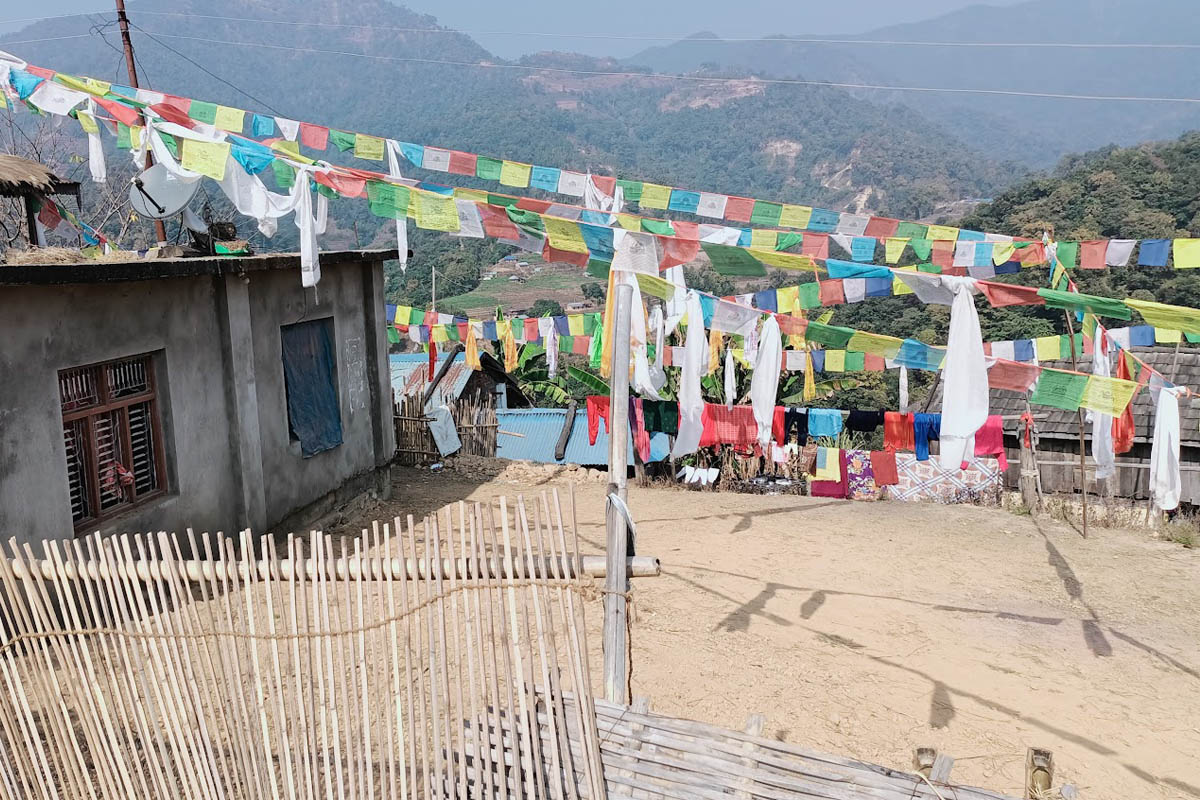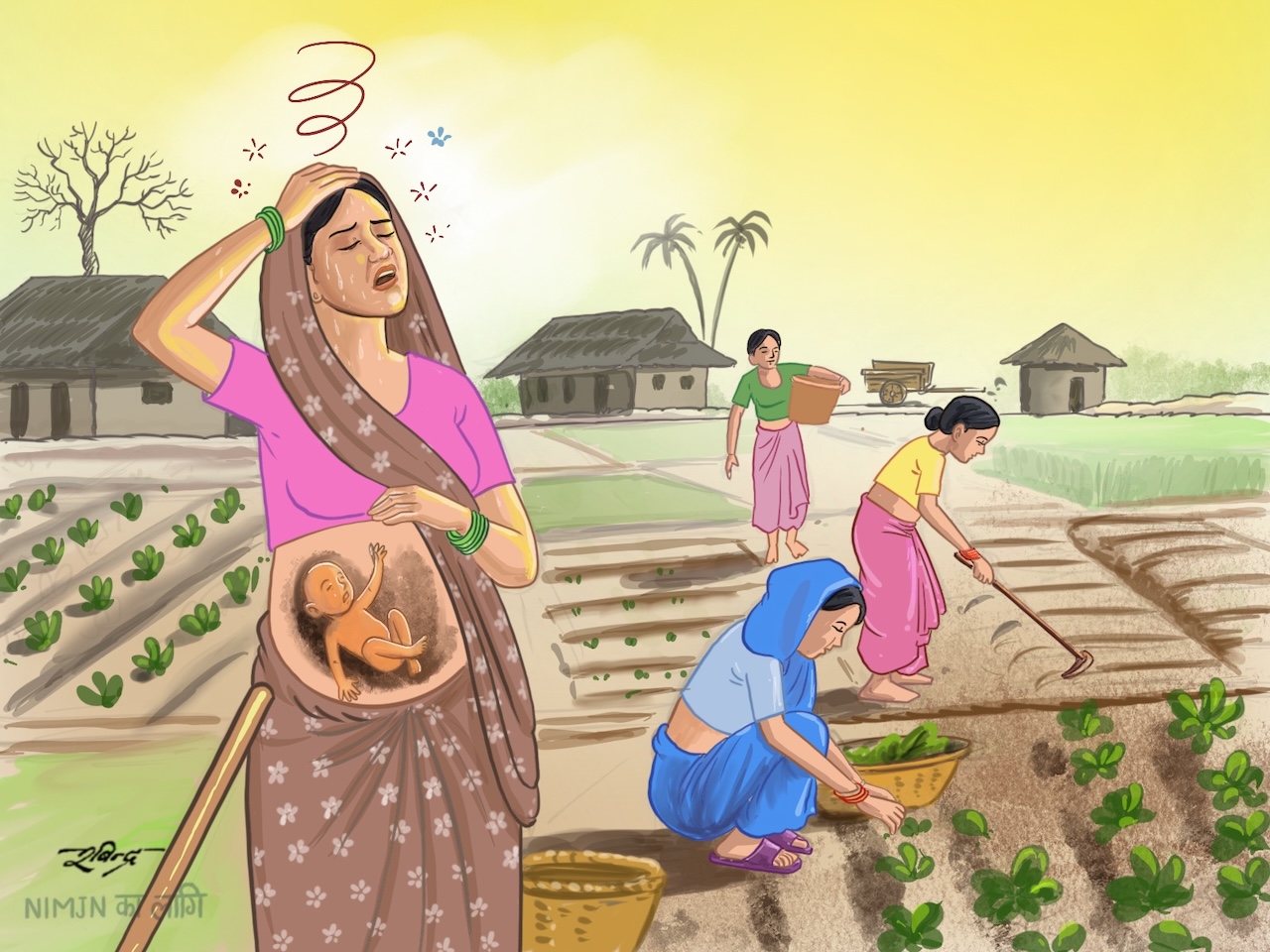In Dolpa, Rupa (name changed), who has a physical disability, was raped on August 9, 2024. Eighteen-year-old Rupa is not mature for her age. Being physically and mentally somewhat weak, she cannot speak clearly or walk well. She has a problem with her leg.
 After it was known that Rupa had been raped, the police arrested the accused, a 29-year-old Jitman Roka from Rolpa, and kept him in custody for one night. However, Rupa's grandfather said that a verbal agreement was reached after the accused assured Rupa that he would marry her. After the agreement, the accused was released from custody and fled.
After it was known that Rupa had been raped, the police arrested the accused, a 29-year-old Jitman Roka from Rolpa, and kept him in custody for one night. However, Rupa's grandfather said that a verbal agreement was reached after the accused assured Rupa that he would marry her. After the agreement, the accused was released from custody and fled.
"We made an agreement thinking that he might marry our disabled granddaughter and make her happy," the grandfather said with regret. "But the boy betrayed us. I have filed a complaint with the police but since the boy is absconding, my granddaughter has not been able to get justice."
In Rupa's case, a verbal agreement was made with the rape accused to marry the victim, which in itself is a serious offense.
The National Penal Code (2017) has provisions stating that after the commission of an offense related to rape, no one should, by any means of fear, intimidation, threat, or coercion, with or without any exchange of goods or money, persuade the victim or the victim's family to refrain from filing a complaint, lodging a report, or appearing in court. Furthermore, it prohibits arranging or pressuring for or influencing any reconciliation or settlement between the perpetrator and the victim or a member of the victim's family.
The National Penal Code also stipulates that anyone who facilitates such a settlement shall be liable to imprisonment for up to three years and a fine of up to 30,000 rupees. However, despite these legal provisions, incidents of rape and violence against women continue to occur in geographically remote Dolpa, and the aforementioned incident is an example of such cases being settled out of court against the law.
The District Police Office, Dolpa, however, claims that in this case, the boy was arrested based on a verbal complaint stating that he had caused a disturbance while intoxicated and was released the next day. Rajesh Basnet, spokesperson for the District Police Office, Dolpa, stated that he was not at the office when the incident occurred, saying, "When I inquired about that incident, I found out that a complaint was filed stating that the boy had created a commotion while drunk, and he was released the following day."
Victims also often remain silent because they fear that if the incident comes to light, it will become very difficult for the woman to live in society later on. Even in some cases where they barely come forward to file a complaint, the victims change their statements in court after the case is registered. On October 1, 2024, in a rape case filed at the District Court of Dolpa, the victim girl changed her statement.
In her statement to the court, the victim girl said, "The defendant did commit wrongdoing against me at the scene but it was not an attempted rape. I wrote that statement because I was sick and the villagers told me to write it in a way that matched the complaint."
Based on the victim's statement itself, the Dolpa District Court acquitted the accused on March 4, 2025. The verdict issued by Judge Chandradev Bharati states, "The main person involved in the incident, the victim complainant herself, testified in court that the defendant did commit wrongdoing against me but it was not an attempted rape. She clearly stated herself, contrary to the complaint she had filed, that the defendant only assaulted her physically, and therefore should not be punished for attempted rape…"
The father of the girl who changed her statement in court said that his daughter did so due to fear. "We filed a police complaint a few days after the incident," he said, "but after receiving repeated threatening phone calls, and seeing that my daughter's safety was at risk, she changed her statement."
He stated that it is extremely difficult for victims to get justice in Dolpa. He also explained that he stopped collecting evidence to support the incident because he feared it would create further difficulties for his daughter later on, and that is why the accused was acquitted.
Rana Bahadur Karki, secretary of the Non-Governmental Organizations Federation, shares his experience that even now, in geographically remote places including Dolpa, rape is not always taken as a heinous crime. "A trend of victims actively seeking legal remedies is not seen," Karki said. "Due to a lack of information about where to go, how to seek legal help, and who will advocate for them in the future, such incidents do not even come to light."
Karki states that victims also endure injustice because they lack faith in the justice system. "What's the point in going to the district [district court]? They will immediately have someone put in a good word for the accused, we have no one there, we have no leader there," Karki said. "Instead, the understanding among victims is to just stay in the village, not say anything if possible, and settle it here."
It is also found that efforts are made, as much as possible, to settle even the incidents that do come to light, and only if that fails do they proceed to legal cases. On August 27 and the following day, Bindu (name changed) was raped twice. However, it was only known about a month and a half after she was raped, and that too because she went to the hospital for a check-up after experiencing stomach pain due to pregnancy.
“‘Your daughter is pregnant, there is a baby in her womb,’” Maya (name changed), the mother of 15-year-old Bindu who had come to the hospital complaining of stomach pain, still remembers the doctor's words after her health check-up.
Hearing the Dolpa District Hospital doctor's statement felt like the sky had fallen on her. "It felt unreal, for a moment I was completely stunned," Bindu's mother Maya said, recalling that day.
Maya, who had been living and doing business in a rented room in Dunai, then brought her daughter to the room and started questioning her. During the questioning, Maya said, it was revealed that Yagya BK from their village had raped her daughter.
If she hadn't gotten pregnant, this crime against her might never have been made public. This is because the person, who was more than twice Bindu's age, had threatened to kill her if she revealed the incident. "He had said, 'if you tell the doctor or Mummy, I will cut you into pieces,'" Bindu said timidly during a conversation with us.
After learning that her daughter was pregnant, Maya called the accused Yagya to her room for discussion. During the discussion, Yagya, who left the room saying he would be back in 5 minutes, did not return. It was only after this that Maya went to the District Police Office with a complaint stating that her daughter had been raped.
The accused Yagya is currently in custody, and the case is under consideration in the District Court. In his statement to the police, Yagya admitted that he became acquainted with the victim on August 26 while watching the Teej festival dance, met her on the 27th and 28th, and had consensual sexual relations on September 2. In his statement to the police, he said, "...on the 2nd, the victim came to my room and said that her mother was not there and asked me to come to her room and sit together. So, that night, after consuming a bottle of alcohol, I went to her room...and had consensual sexual relations with the victim.”
Even though Yagya claims to have had consensual sexual relations, this is still rape, or forcible carnal knowledge. The National Penal Codestates that if a person engages in sexual intercourse with any woman without her consent, or even with consent if the woman is a girl under the age of 18, that person shall be considered to have committed rape against such woman or girl.
Pressure to settle from family and neighbors
Maya was pressured by family members and neighbors to withdraw the police complaint right from the beginning. Even now, while the case is under consideration in court, she continues to face such pressure.
"The boy's side is saying they will give 4-5 lakhs to settle the matter and sideline the case," Maya said. She currently wants the defendant, who forcibly impregnated her minor daughter, to receive the maximum punishment according to the law. Maya stated that she has no intention of changing her statement or settling the case.
In Rupa's case as well, her grandfather says that there was pressure from the accused party to settle. He stated that he agreed to a settlement because of the pressure after the accused was arrested, and the accused then absconded after being released from custody.
Karki, who is also a social activist, acknowledges that there is a tendency to pressure the victim's side for reconciliation as much as possible and to sideline cases by showing the power of money.
The main reason why incidents of rape and domestic violence in Dolpa do not come to light is the social and family structure here. Karki says that politics also makes a difference in some cases. "There is a practice of settling cases by giving a little money and pressure to the victim, thinking that the accused is from their own village or their own party," says Karki.
The victim always in trouble
After it was discovered that Bindu was pregnant as a result of rape, the Dolpa District Hospital referred her to Karnali Provincial Hospital in Surkhet. Maya recalls that when a video X-ray was done in Surkhet on October 27, 2024, the baby in her womb was found to be 8 weeks and 6 days old, so the doctor said that the abortion would only be done after 12 weeks. "After that, I left my daughter at a rehabilitation center in Surkhet and returned to Dolpa," Maya said.
Maya informed that her daughter was then admitted to the hospital on November 20 and her abortion was done with the help of medication on the 21st. She said that her daughter has still not returned to her previous state after the abortion. Maya stated that even though it has been more than 4 months since the abortion, Bindu still experiences stomach pain and bleeding.
Kalpana Thapa, senior nursing officer at Surkhet Provincial Hospital, states that when abortions are performed on young girls, they often experience mental and physical complications later on. Thapa mentioned that issues such as bleeding, abdominal pain, and in some cases, even uterine perforation are seen.
Rupa has become a stark example of the extent to which rape affects a young girl. The incident caused her so much trauma that even after about 8 months, she has not been able to return to a normal state. "She even went to jump into the Bheri River two or three times," Rupa's grandfather said. "It became very difficult to handle my granddaughter, so I even asked for help from the police and local authorities."
She was then taken to a rehabilitation center in Surkhet. Rupa's grandfather said that her elder sister has now taken her to Kathmandu. He also mentioned that they are looking for an organization that can provide support, shelter and food for Rupa, who has a disability.
In remote Dolpa, there are no organizations to provide counseling for individuals who have experienced any traumatic events. "The lack of organizations in the district that provide counseling and advice has also created problems," Rupa's grandfather said.
(This investigative report was prepared through the NIMJN fellowship supported by the Australian Aid. All rights reserved with the author and publisher.)
Please adhere to our republishing policy if you'd like to republish this story. You can find the guidelines here.


